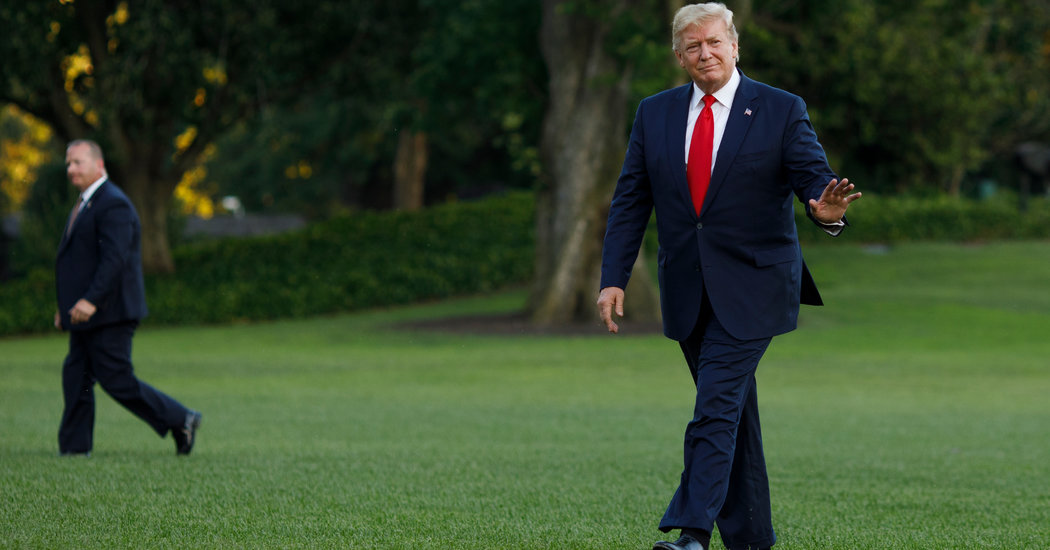WASHINGTON — The House filed a lawsuit on Tuesday to force the Treasury Department to turn over President Trump’s tax returns, escalating a fight with an administration that has repeatedly dismissed as illegitimate the Democrats’ attempt to obtain Mr. Trump’s financial records.
The lawsuit moves the dispute into federal courts after months of sniping between the Democratic-led House Ways and Means Committee, which requested and then subpoenaed the returns, and the Treasury secretary, Steven Mnuchin. The outcome is likely to determine whether financial information that Mr. Trump — breaking with longstanding tradition — has kept closely guarded as a candidate and as president will be viewed by Congress and, ultimately, by the public.
But with the House and the executive branch locked in a broader struggle over access to information from and witnesses in the Trump administration, the stakes in the tax-return lawsuit may be higher than that particular issue. House Democrats are facing resistance on a broad range of investigations that include inquiries into Robert S. Mueller III’s inquiry into Russian election interference, the addition of a citizenship question into the 2020 census, and the profits gleaned from Mr. Trump’s ongoing business ventures.
In almost every instance, the Trump administration has argued that Congress’s power to access those materials is inherently limited to information that would serve “legitimate” legislative purposes — defined by the executive branch as materials primarily needed to help draft new laws.
Congress retorts that its powers to compel information are far more sweeping than that and encompass oversight of important matters in general — and that its decisions about what information it wants to subpoena are not to be second-guessed by the White House.
A ruling by a federal court on the merits of the recurring dispute could shift the balance of power between the two branches and impact the authority of Congress to conduct oversight over not just Mr. Trump but presidents for years to come.
That outcome, though, could take months or years — a reality certain to frustrate liberals who are irate both at Mr. Trump’s across-the-board blockade of congressional subpoenas and at the House’s plodding pace in bringing the case to court.
Democrats have clamored for Mr. Trump’s returns since he burst onto the political stage, convinced they will show that he has distorted his assets and potentially defrauded the government. They have indicated they are preparing other lawsuits as well, including one to force the former White House Counsel Donald F. McGahn II to testify despite White House claims that he and other top presidential advisers have “absolute immunity” from congressional subpoenas.
Mr. Trump was the first major presidential candidate in decades not to voluntarily release his tax returns. He has said that they were under audit by the I.R.S., but that does not actually preclude him from releasing them to the public.
The chairman of the Ways and Means Committee, Representative Richard E. Neal of Massachusetts, initially requested six years of Mr. Trump’s returns in early April using a little-known provision of the federal tax code that grants the chairmen of Congress’s tax-writing committees the power to request tax information on any filer. The provision in question — Section 6103 — dates from the Teapot Dome scandal of the 1920s and says merely that the Treasury secretary “shall” furnish the requested material.
Mr. Mnuchin rejected the request anyway, prompting Mr. Neal to shift tactics and counter in May by issuing subpoenas for the same material. That led to another rejection by Mr. Mnuchin “for the same reasons.”
The Justice Department backed that up in recent weeks with an opinion written by its Office of Legal Counsel undergirding Mr. Mnuchin’s argument and forecasting what the Trump administration could argue in court. In the 33-page memo, Steven A. Engel, the office’s leader, argued that Democrats’ request amounted to an attempt to gain access to Mr. Trump’s finances for political reasons in order to release them to the public.
Mr. Engel dismissed Mr. Neal’s stated rationale — the chairman says he needs the returns for an investigation of the I.R.S.’s presidential audit program and whether the law governing it should be changed — as “pretextual” and concluded that the committee did not have a “legitimate legislative purpose” in trying to obtain Mr. Trump’s tax information.
“While the executive branch should accord due deference and respect to congressional requests, Treasury was not obliged to accept the Committee’s stated purpose without question, and based on all the facts and circumstances, we agreed that the Committee lacked a legitimate legislative purpose for its request,” he wrote.
The Trump administration and the president’s personal lawyers have raised the “legitimate purpose” argument repeatedly as they have sought to parry Democratic requests related not just to Mr. Trump’s finances but also to question Congress’s right to information related to the special counsel’s investigation as well.
The Ways and Means Committee lawsuit for Mr. Trump’s tax returns is the first exercise of that authority.
Even so, liberals have been frustrated with the pace of the case and have repeatedly targeted Mr. Neal in recent months, urging him to move more quickly. Stand Up America, a liberal advocacy group, said on Monday that they would be targeting constituents of Ways and Means Committee members by text and email asking them to ask their representatives to press Mr. Neal to go to court.
For now, the dispute over the Mueller investigation materials, which centers on the House Judiciary and Intelligence committees, has not developed into a lawsuit because Attorney General William P. Barr has started providing some access to underlying material from the special counsel investigation, but it may yet reach that point.
The House has also held off from voting to hold Mr. Barr or Mr. Mnuchin in contempt of Congress, a step that in the past has preceded asking a judge to issue an order requiring an executive branch official to comply with a subpoena.


















